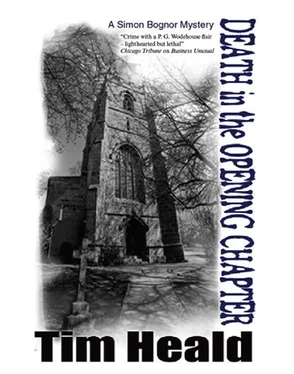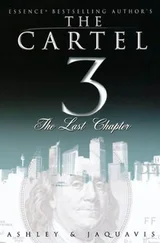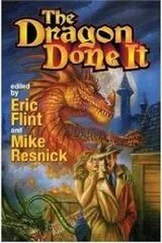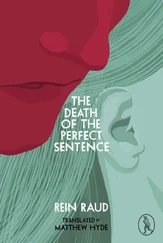Tim Heald - Death in the opening chapter
Здесь есть возможность читать онлайн «Tim Heald - Death in the opening chapter» весь текст электронной книги совершенно бесплатно (целиком полную версию без сокращений). В некоторых случаях можно слушать аудио, скачать через торрент в формате fb2 и присутствует краткое содержание. Жанр: Криминальный детектив, на английском языке. Описание произведения, (предисловие) а так же отзывы посетителей доступны на портале библиотеки ЛибКат.
- Название:Death in the opening chapter
- Автор:
- Жанр:
- Год:неизвестен
- ISBN:нет данных
- Рейтинг книги:5 / 5. Голосов: 1
-
Избранное:Добавить в избранное
- Отзывы:
-
Ваша оценка:
- 100
- 1
- 2
- 3
- 4
- 5
Death in the opening chapter: краткое содержание, описание и аннотация
Предлагаем к чтению аннотацию, описание, краткое содержание или предисловие (зависит от того, что написал сам автор книги «Death in the opening chapter»). Если вы не нашли необходимую информацию о книге — напишите в комментариях, мы постараемся отыскать её.
Death in the opening chapter — читать онлайн бесплатно полную книгу (весь текст) целиком
Ниже представлен текст книги, разбитый по страницам. Система сохранения места последней прочитанной страницы, позволяет с удобством читать онлайн бесплатно книгу «Death in the opening chapter», без необходимости каждый раз заново искать на чём Вы остановились. Поставьте закладку, и сможете в любой момент перейти на страницу, на которой закончили чтение.
Интервал:
Закладка:
‘I am familiar with the tune Ebenezer.’ Bognor tried to sound icy and knowledgeable, but failed at both. Still, he felt piqued, and he did know whereof he spoke. ‘T.G. Williams,’ he said, ‘aka Thomas. 1890 to 1944. Once to every man and nation. Hail thou once despised Jesus. Not in any way to be mixed up with the often omitted line about raising “mine Ebenezer”, which means “stone of help”. It may have been an old folk song. Could have been washed up in a bottle. I think Williams was a plagiarist to be absolutely honest. Anyway, you’re saying that the hymn is a red herring. So, what have you discovered that works?’
He was dredging up something he had been taught in Divinity at his private school many years before. It sounded good to him now, just as it did when he was little. He hoped his wife would not know enough to contradict him. But maybe it was irrelevant. Like him.
‘Aha,’ she said, ‘I’ll only tell you if you cheer up.’ She was truculent, buoyed up by her ability to find the answer and solve the conundrum. Not for nothing was she a whizz at Sudoku.
‘I’m perfectly cheerful,’ he lied. He always felt like this, in what should have been moments of connubial bliss. It didn’t matter that he would present the solution as if it had been all his own work. He and Monica knew otherwise. They understood the truism that behind every good man, there was a woman at least as good. From time to time, Bognor pretended otherwise. Even if it were teamwork, there was a team leader and an ordinary team member, and he knew enough to understand that he was not the team leader.
‘Well, all right, I’ll tell you anyway. There were four hymns listed, OK?’
‘OK.’
She paused, smiled, and shivered.
‘Two of them were ordinary, common-or-garden real hymns. The other two are significant. The last two aren’t hymns at all. They’re both biblical references. One is from the first Book of Samuel and the other is from the Acts of the Apostles. One is about Ebenezer and the other is about Dorcas. Geddit?’
Bognor wasn’t sure. He wasn’t sure of anything any longer. His wife, however, seemed certain of all the answers and she had the bit between her teeth. He was happy to leave it to her. He had little or no alternative since, in any case, she would not allow him one.
‘Carry on,’ he said, lethargically, managing to imply dangerously that she was going to carry on, no matter what.
She looked at him exasperated, but was obviously too excited to care.
‘One was nine-three-six. That’s chapter nine of the Acts, verse thirty-six. The first of the verses telling the story of Dorcas being raised from the dead by St Peter. Except that she’s really called Tabitha. Dorcas is the translation. “Now there was at Joppa a certain disciple named Tabitha, which by interpretation is called Dorcas.” Those are the exact words!’
‘Right,’ he said, ‘and the other is the passage introducing Ebenezer in the first Book of Samuel.’
‘Correct,’ she said, exultantly. ‘Not hymns at all. Seven-one-two, if you remember. In other words, chapter seven, verse twelve, where Samuel says he’s erecting a stone of remembrance to commemorate a defeat for the Philistines between Mizpah and Shen. “Samuel took a stone and set it between Mizpeh and Shen and called the name of it Ebenezer”.’
‘Fascinating,’ said Bognor. ‘So it’s been staring us in the face all the time?’
‘You could say that, yes.’ His wife wore the expression of one who has just conquered a particularly difficult crossword clue.
‘Ebenezer and Dorcas using the hymn board for anyone quick enough and well versed enough in scripture, as it were,’ said Bognor.
‘So, not your average scene of crime officer,’ agreed Monica. ‘Nor your average pathologist. Adam Dalgleish, perhaps. Or Peter Wimsey. But not in real life.’
‘Your “average pathologist” wouldn’t have visited the scene of crime,’ said Bognor, a shade pedantically. ‘It’s one reason I’m so sceptical about pathology, autopsies and post-mortem examinations. They’ve never yet told me anything I didn’t know already, and often significantly less as of now. I knew I didn’t like the pathologist. Solving the clues of the hymn board needed someone like you. Like us.’
His wife smirked and said nothing. There was no need.
Dorcas was drinking Bovril when Bognor arrived. He had a feeling that Dorcas was always drinking Bovril, and in a metaphorical sense he was, perhaps, right. The Bovril was in a blue and white mug of a hooped design known as Cornish, and it was scaldingly hot. Dorcas’s ancestors would have drunk Bovril too, but they would have called it ‘Beef tea’.
She did not offer Bognor anything, but asked him if he would like to sit, which he did.
For a while, he remained silent, his gaze held by a sampler, early Victorian, framed on the wall opposite.
She sat too and sipped Bovril. She too did not speak.
In the hall, a grandmother clock ticked noisily and struck a quarter past, whirring before it did so.
‘Sebastian wasn’t dead when you entered the church,’ he said. It was a statement, not a question. He was not expecting an answer, let alone a ‘no’.
She bent her head.
‘You cracked the code.’
Same thing. A statement. Not a question.
‘We cracked the code. I cracked the code. Not difficult. Particularly not when one realized one wasn’t dealing with hymns but the Bible.’ He was being shameless. Left to his own devices he would almost certainly have been none the wiser. Without Monica, he would have assumed that all four sets of numbers referred to hymns.
‘The Bible?’
She needed to know that his deduction was based on legwork and knowledge, not fluke.
‘Yes.’ he said. He was being economical with the truth, and they both knew it.
The silence should have been awkward but instead it seemed oddly companionable.
Presently, the vicar’s widow said, ‘It was Ebenezer’s idea.’
‘Ebenezer’s?’
‘Yes.’ After a while, she added, by way of explanation, ‘He wanted it to be easy but not too easy. He was anxious that our presence should be known but not to everyone. He seemed to think that the information should be privileged. Given only to people who were privy to a little knowledge and had at least an elementary grasp of deductive principles.’
‘I see,’ said Bognor. He didn’t but it did not seem to matter. He thought it meant that Ebenezer wanted them to know but not the world and his wife. It was the work of an elitist.
‘Poor Sebastian,’ she said. ‘He’d given up really. Everything was suddenly too much.’
‘Really? Most people thought he was pretty much on top of things. He was intending to deliver his sermon, after all. That doesn’t sound like someone who’s given up.’ Bognor was bothered by this. The dead vicar did not give the posthumous impression that he thought that day would be his last. He was preparing his sermon. That meant that he hoped to deliver it.
‘Maybe only those who knew him intimately quite realized. He was surprisingly good at keeping up appearances. That mattered right to the end. He didn’t want anyone to know that he was exhausted. I sometimes think, late at night, that it was other people’s opinions that killed him. They mattered far more than they should.’ He couldn’t work out if she were telling the truth. If not, she was a clever liar. More probably, she wasn’t entirely certain, but was making her story up as she went along. Sometimes, Sebastian wished he were dead; sometimes not. That, alas, was human nature. Even vicars lacked consistency.
‘Part of the price of being in the public eye,’ he said, wondering if being the Vicar of St Teath’s in Mallborne was the same as being ‘in the public eye’. ‘Other people,’ he continued, ‘have opinions. They seem to believe they have a right to them. And people who are sensitive think they matter.’
Читать дальшеИнтервал:
Закладка:
Похожие книги на «Death in the opening chapter»
Представляем Вашему вниманию похожие книги на «Death in the opening chapter» списком для выбора. Мы отобрали схожую по названию и смыслу литературу в надежде предоставить читателям больше вариантов отыскать новые, интересные, ещё непрочитанные произведения.
Обсуждение, отзывы о книге «Death in the opening chapter» и просто собственные мнения читателей. Оставьте ваши комментарии, напишите, что Вы думаете о произведении, его смысле или главных героях. Укажите что конкретно понравилось, а что нет, и почему Вы так считаете.












